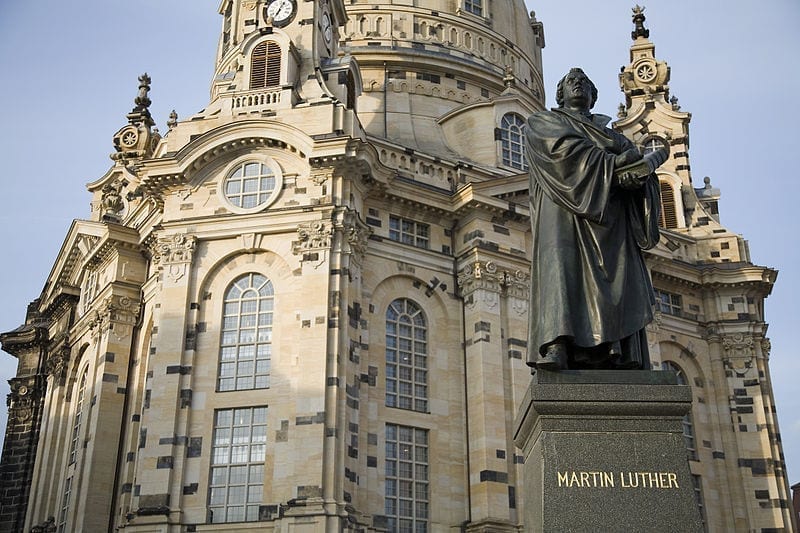Martin Luther’s Protestant Reformation turns 500 today. How times have changed, now that it’s the Pope urging charity and the conservatives talking schism.
For many families across the United States and the world, today is Hallowe’en, that commercialized bastardization of the Christian All Saints’ eve, which is itself was stolen from the Celtic holy day of Samhain. For the ancient people of the British Isles, this was a liminal time, the end of the harvest season and transition into the winter months, when the veil between the worlds is at its thinnest and one could, perhaps, commune with the ancestors. The Old Ones I’m invoking today, however, are more Continental in origin. Today also marks the 500th anniversary of one of the most effective protest movements of all time: the Protestant Reformation.
On October 31st, 1517, Martin Luther had enough! He was sick of the corruption endemic within the Catholic church. He composed one of the most famous listicles of all times, the 95 Theses, and according to legend, posted his rant on his local BBS, by which I mean the church door. Reaction was swift. Luther also made enough copies to ensure that many people in his network could read his objections to the sale of indulgences, the idea that grace comes from faith alone, the validity of sincere repentance, and that sharing one’s wealth with the poor is superior to buying one’s forgiveness from the Church. Luther himself faced trial and reckoning at the hands of Catholic authorities, but the Protestant Reformation was unstoppable. Once the schism reached critical mass and the secular heads of state throughout Europe could choose to bow to Papal authority – or not – the split in Holy Mother Church changed Western history.
While the sale of indulgences was banned by Pope Pius V in 1567, it wasn’t until Vatican II in the 1960s that the Catholic church came around to many (but not all) of Luther’s complaints. The genie freed by the Protestant Reformation can never be put back in the bottle, but Roman Catholics have accepted, for example, the ideas that salvation is freely given to those with the faith to accept it, and that the Bible should be available to people in their own language.
The liberalization of the Catholic church after Vatican II was not, however, universally and enthusiastically embraced. As in every society, there are holdouts who resist evolving attitudes and changing times. The fossilized wing of the Catholic church, skeptical of Vatican II, got their vestments in a bunch after Cardinal Jorge Bergoglio’s elevation to Pope in 2013. Chosen as a Hail Mary move by his fellow cardinals, Bergoglio, like a neutral-good version of Donald Trump, was meant to drain the Vatican’s swamp, if you will. Internationally beloved, Pope Francis faces harsh criticism from within his own organization, some of whom can’t wait until he dies.
Why the only future worth building includes everyone, a TED Talk by Pope Francis. (Be sure to turn on the closed captioning!)
While the Protestant Reformation went down 500 years ago because Luther’s vision of what was good and true differed greatly from the real-world exercise of corrupt power within the church, we have a nearly opposite situation today. Pope Francis, imperfect as he is, aims to steer the Catholic church in a direction that may have pleased Luther. While his enemies want to hold the Church separate from the world, Francis, with his missives on climate change, benevolence for refugees, and realistic view of divorce in 2017, stands worlds apart from what Luther’s schism eventually wrought. If Pharisee-like cardinals like the American Raymond Burke, the Pope’s most public opponent, want to go about in excessively rich garb, preaching the evils of feminism while shilling for free markets and palling around with Steve Bannon, they’re more than welcome to buy their indulgences from the likes of Joel Osteen.
As we move into the dark season and our half of the world becomes a colder place, both seasonally and metaphorically, perhaps it’s time to heal our rifts and work together in the face of great changes that are even now rolling over us. If that’s not possible, I’d rather work with the likes of Pope Francis, despite our differences, than with the Cossacks in cassocks threatening a more modern-day schism.
Related: American Christianity is Losing Its Soul


Join the conversation!